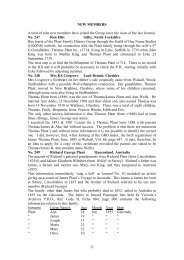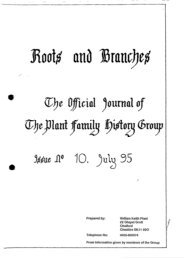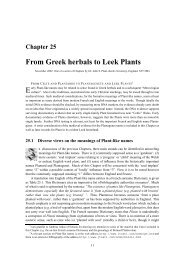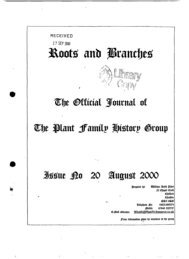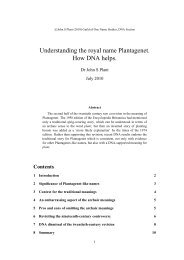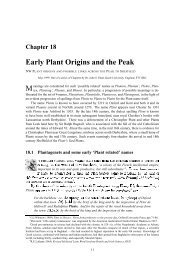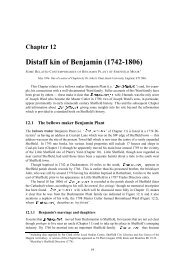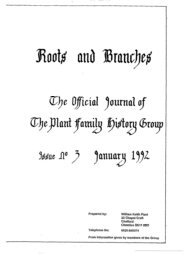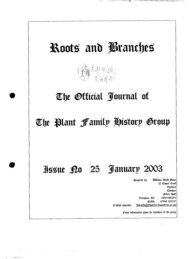Chapter 34 Austin Plant - Plant Family History Group
Chapter 34 Austin Plant - Plant Family History Group
Chapter 34 Austin Plant - Plant Family History Group
Create successful ePaper yourself
Turn your PDF publications into a flip-book with our unique Google optimized e-Paper software.
CYRIL THOMAS HOWE PLANT, BARON PLANT (1910-1986)<br />
Taken from Oxford Dictionary of National Biography<br />
Cyril Thomas Howe <strong>Plant</strong>, trade union official, was born on 27 August 1910 in Leek,<br />
Staffordshire, the only son and elder child of Sidney <strong>Plant</strong>, manager of a Co-operative<br />
Society Shop, and his wife, Rosina Edna Thomas, who previously ran a grocer’s shop.<br />
He was educated at Leek high school, where he was head boy and captain of the<br />
cricket team. In 1927 he began work as a sorting clerk in the post office in Leek,<br />
where his interest in trade unions began. In these early years he was a keen local<br />
amateur association football player, and later became a referee, developing an interest<br />
in football that he retained throughout his life.<br />
In 19<strong>34</strong> <strong>Plant</strong> was successful in the limited competition for entry to the civil service<br />
clerical class. He joined the Inland Revenue in the collection service as an assistant<br />
collector. He quickly became a delegate to the conference of the newly formed Inland<br />
Revenue Staff Federation. He was elected to the executive committee of the<br />
federation and in 1937 became honorary secretary of the collection section. At this<br />
time the federation was still an unsettled alliance of former collection, inspectorate,<br />
and valuation divisions. <strong>Plant</strong> developed, and later finely tuned his skills as mediator<br />
and conciliator, helping to bind the union together. Later his skills as a ‘fixer’ were to<br />
be of great service to the international trade union movement. He was appointed in<br />
1944 to a full-time federation post as assistant secretary and then deputy general<br />
secretary. In 1960 he succeeded Douglas Houghton as its general secretary. There<br />
were by then relatively few opportunities for the federation , through <strong>Plant</strong>, to obtain<br />
improvements significantly in advance of the rest of the civil service and he directed<br />
much of his energies and abilities into broader areas of trade union and related<br />
activities.<br />
<strong>Plant</strong> was a member of the Trade Union Congress general council from 1964 to 1976<br />
and served on its economic and international committees. His expertise on fiscal and<br />
economic subjects gave him far greater authority and respect than usual for someone<br />
from such a small union, and this was buttressed by his willingness to offer his<br />
colleagues good advice on income tax matters and frequent tips, some good and some<br />
less good, on horse-racing, which was a passionate interest of his. He was chairman<br />
of the TUC in 1975-6. He also fulfilled many TUC duties, including membership of<br />
public bodies such as the Community Relations Commission (1974-7), the<br />
Monopolies and Mergers Commission (1975-8), and the departmental committee of<br />
inquiry into police pay chaired by Lord Edmund Davies (1977-8). After retirement in<br />
1977 he became parliamentary adviser to the Police Federation and assiduously<br />
defended its interests in the House of Lords. A police band played at his funeral.<br />
<strong>Plant</strong> was active at International Labour Office (ILO) conferences from 1965<br />
onwards, and the ILO gave him a major platform to press for the development of trade<br />
union rights and improvements in working conditions, particularly of public service<br />
employees, throughout the world. He was a member of the governing body of the<br />
ILO from 1969-1977. He played a powerful role in the programme, financial, and<br />
administrative committee, a body which exerted great authority over finance and<br />
allocation of resources during the difficult period when the USA withdrew<br />
membership and subscriptions. In the international context <strong>Plant</strong> displayed the many<br />
virtues of British trade union leaders in international settings. He grasped the<br />
importance of obtaining agreement and consensus from delegates, and his mastery of<br />
the complexities of procedural provisions allowed him to produce solutions that were<br />
acceptable to all. He spoke with eloquence, wit, and authority, earning respect from<br />
employers and government delegates alike.<br />
26



